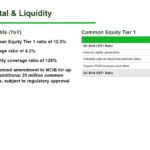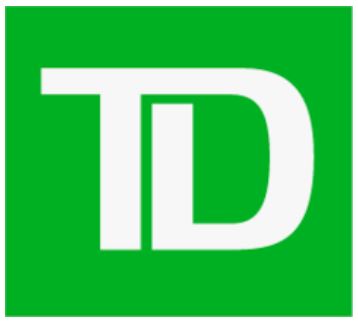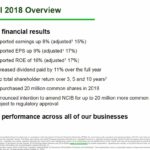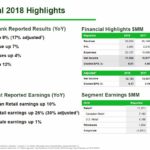Summary
- TD reported strong FY2018 results and senior management is confident it can continue to deliver adjusted EPS growth within the 7% – 10% medium-term target range.
- It has a well diversified business model, credit quality is strong, and it maintains a strong Basel III Common Equity Tier 1 (CET1) ratio.
- I anticipate a $0.06/share/quarter increase in TD’s dividend when it releases its Q1 2019 results at the end of February/early March. This would bring the quarterly dividend to $0.73/share.
- I view TD as currently being fairly valued.
All figures are expressed in CDN $ unless otherwise noted.
Introduction
This third article in this series covering the Big 5 Schedule A Canadian banks touches upon The Toronto-Dominion Bank (TSX: TD); TD released its Q4 and FY2018 earnings on November 29.
Article 1 covered The Bank of Nova Scotia (TSX: BNS) and article 2 covered The Royal Bank of Canada (TSX: RY).
In my September 5th article I indicated various headwinds/uncertainties made me reluctant to acquire additional shares in any of the Big 5 other than through the automatic reinvestment of all dividends; TD’s share price has retraced ~8% subsequent to that article.
Please refer to article 2 in which I cover Canada’s FI landscape.
Q4 and FY2018 Results
TD’s Earnings Release can be found here and its detailed investor presentation can be found here.
Earnings for the year exceeded $12B representing a 15% increase from FY2017’s $10.6B.
Revenue grew 8% and return-on-equity rose to ~17%. This was driven by increases in all of the bank’s business segments.
In FY2018, TD bought back 20 million common shares and on November 29th, TD announced its intention to repurchase up to an additional 20 million common shares for cancellation in FY2019 subject to regulatory approval.
Source: TD – Q4 and FY2018 Financial Results – November 29 2018
FY2019 Outlook
TD has a proven business model, a diversified business mix, and a North American footprint which offers growth in scale opportunities.
TD’s businesses are entering FY2019 with continued good momentum. The Canadian and U.S. economies are performing well, credit quality continues to be strong across the bank’s portfolios, and management expects further margin expansion as interest rates trend higher.
Subject to quarterly seasonal fluctuations, and provided economic conditions remain supportive, management expects FY2019’s provision for credit losses to be in the range of 40 – 45 bps.
Credit Ratings and Risks
TD’s current ratings and outlook from Moody’s, S&P Global, and DBRS meet my risk tolerance level.
 Source: TD – Q4 and FY2018 Financial Results – November 29 2018
Source: TD – Q4 and FY2018 Financial Results – November 29 2018
The Risk Review component of TD’s Q4 Investor Presentation found on pages 12 – 16 provides an overview of the risk aspect of the bank’s various credit related lines of business.
Valuation
TD reported $6.01 of diluted EPS and $6.47 of adjusted diluted EPS versus $5.50 and $5.54 in FY2017. This represents diluted EPS growth of ~9.3% and adjusted diluted EPS growth of ~16.78%.
TD’s diluted EPS growth has varied widely in recent years. In FY2011, FY2012, FY2013, FY2014, FY2015, FY2016, and FY2017 TD reported diluted EPS of $3.215, $3.38, $3.44, $4.14, $4.21, $4.67, and $5.50 or growth of 5.1%, 1.8%, 20.3%, 1.7%, 10.9%, and 17.8%.
NOTE: On December 5, 2013, TD announced a stock dividend of one common share per each issued and outstanding common share which has the same effect as a 2 for 1 stock split; EPS for 2011 – 2013 has been adjusted to account for this split.
On the November 29th conference call with analysts, TD’s Chairman, President and CEO indicated senior management is of the view that it can continue to deliver adjusted EPS growth in 2019 within the bank’s 7% – 10% medium-term target range. Management, however, has indicated there are current and emerging strains in the energy and automotive manufacturing sectors of the economy. If these factors intensify they could impact the bank’s view of FY2019.
If we use 8.5% adjusted EPS growth, which is the mid-point of the medium-term target range, we arrive at projected diluted EPS of $7.02 for FY2019.
TD is trading at ~$72.70 as I compose this article. Using the $7.02 projected adjusted diluted EPS we get a forward adjusted diluted PE of ~10.36.
By way of comparison, when TD released its FY2017 results on November 30, 2017, it reported adjusted diluted EPS of $5.54. On the date of the earnings release TD’s shares closed at $73.24 giving us an adjusted diluted PE of 13.22.
Had we used the 8.5% adjusted EPS growth rate just like above, we would have arrived at projected adjusted diluted EPS of $6.01 for FY2018. With shares trading at $73.24 on November 30, 2017 the adjusted projected diluted PE for FY2018 would have been 12.19.
Based on the above, TD’s shares are more attractively valued than a year ago.
Dividends
TD’s dividend history can be found here.
TD’s 4th quarterly $0.67/share dividend will be distributed January 31, 2019. The current $2.68 annual dividend provides investors with a yield of ~3.69% using the current ~$72.70 stock price.
Unlike RY, BNS, BMO, and CM which increase their dividend twice a year, TD has restricted its dividend increases to once a year; this started in 2014. The dividend increase is typically declared in March so as to take effect late April. Looking at the dividend increases in recent years we see they have ranged between 7.8% – 11.7%.
I anticipate TD will announce a $0.06/share/quarter increase when it releases its Q1 2019 results at the end of February/early March bringing the quarterly dividend to $0.73/share (up from $0.67/share). On this basis, my $2.92 projected annual dividend provides a forward dividend yield of ~4.02%; TD’s dividend yield is generally the lowest of the Big 5.
Final Thoughts
Just like RY, TD is a high quality large cap bank with a consistent track record of profitability and dividend growth. I view TD and RY as the top 2 Canadian banks and don’t spend time debating which is better than the other. I have just chosen to simply invest in both and view them as a core component of my investment portfolio.
In my opinion, TD is currently fairly valued. I do not, however, plan to acquire additional shares as I currently have a full position and will simply continue to automatically reinvest the dividends which should increase my TD exposure by ~17 – 22 shares quarterly.
I hope you enjoyed this post and I wish you much success on your journey to financial freedom.
Thanks for reading!
Note: I sincerely appreciate the time you took to read this article. Please send any feedback, corrections, or questions to charles@financialfreedomisajourney.com.
Disclaimer: I have no knowledge of your individual circumstances and am not providing individualized advice or recommendations. I encourage you not to make any investment decision without conducting your own research and due diligence. You should also consult your financial advisor about your specific situation.
Disclosure: I am long BMO, BNS, CM, RY, and TD.
I wrote this article myself and it expresses my own opinions. I am not receiving compensation for it and have no business relationship with any company whose stock is mentioned in this article.




